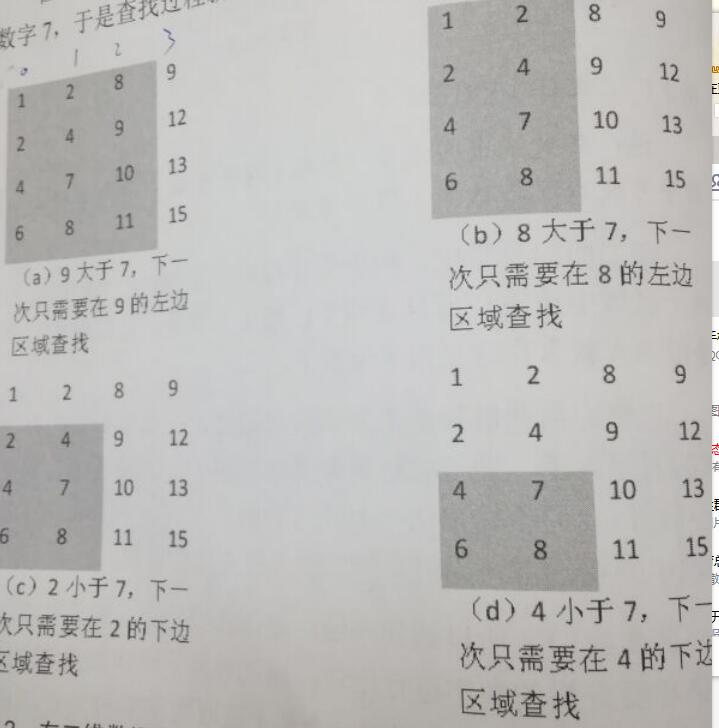题目:
在一个二维数组中,每一行都按照从左到右递增的顺序排序,每一列都按照从上往下递增的顺序排序。请完成一个函数,输入这样的一个二维数组和一个整数,判断数组中是否含有该整数。
例如下面的二维数组就是每行、每列都是递增排序。如果在这个数组中查找数字7,则返回true,如果查找数组5,由于数组中不含有该数字,则返回false。
1 2 8 9
2 4 9 12
4 7 10 13
6 8 11 15
当我们解决一个问题的时候,一个很有效的方法就是从一个具体的问题入手,通过分析简单具体的例子,试图寻找普遍的规律。
总结查找的过程,我们发现如下规律:首先选取数组中右上角的数字,如果该数字等于要查找的数字,则查找过程结束;如果该数字大于要查找的数字,则剔除这个数字所在的列;如果该数字小于要查找的数字,则剔除这个数字所在的行。也就是说,如果要查找的数字不在数组 的右上角,则每一次都在数组的查找范围中剔除一行或者一列,这样每一步都可以缩小查找的范围,直到找到要查找的数字,或者查找范围为空。,在前面的分析中,我们每次都是选取数组查找范围内的右上角数字。同样,我们也可以选取左下角的数字。但是我们不能选择左上角数字或者右下角数字,因为这两个方向我们无法缩小查找的范围。

public class FindFromMatrix { private static int[][] sample = new int[][] { { 1, 2, 8, 9 }, { 2, 4, 9, 12 }, { 4, 7, 10, 13 }, { 6, 8, 11, 15 } }; public static void printSample() { for (int i = 0; i < sample.length; i++) { for (int j = 0; j < sample[i].length; j++) { System.out.print(sample[i][j] + " "); } System.out.println(); } } public static boolean getValuefromMatrix(int[][] sample, int rows, int columns, int num) { boolean found = false; if (sample != null && rows > 0 && columns > 0) { int row = 0; int column = columns - 1; while (row < rows && column >= 0) { int tempValue = sample[row][column]; if (num > tempValue) { ++row; } else if (num < tempValue) { --column; } else { found = true; break; } } } return found; } public static void main(String[] args) { printSample(); System.out.println(getValuefromMatrix(sample, 4, 4, 7)); } }
测试用例:
二维数组中包含查找的数字
二维数组中没有要查找的数字
特殊输入测试(输入空指针)